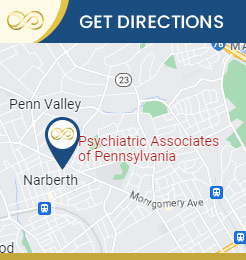Treatment Resistant Depression Experts on the Main Line of Philadelphia, in Narberth PA
Do you ever question: What is depression? Why isn’t my depression getting better? Why am I stuck in depression? Why am I always depressed? Is there any hope? What if I cannot tolerate antidepressants? How can depression be treated when medications have failed? How can TMS treat depression? At Psychiatric Associates of Pennsylvania, we offer the most advanced and comprehensive treatment options for difficult-to-treat depression. For more information contact us today or schedule an appointment online. We are conveniently located on the Main Line of Philadelphia at 822 Montgomery Ave Suite 208, Narberth, PA 19072. We serve patients from Narberth PA, Philadelphia PA, Media PA, King of Prussia PA, Newtown Square PA, Wayne PA, Malvern PA, Plymouth Meeting PA, Ardmore PA, Villanova PA, Abington PA, and surrounding areas.


Table of Contents:
What is Depression?
What is Treatment Resistant Depression?
Is there hope for my depression?
How is Treatment Resistant Depression Treated?
Depression is a mental health disorder characterized by persistent feelings of sadness, hopelessness, and a lack of interest or pleasure in activities. It goes beyond normal feelings of sadness or grief and can significantly interfere with a person’s daily functioning, affecting their ability to work, study, sleep, eat, and enjoy life.
Symptoms of depression can vary from person to person, but commonly include:
– Persistent feelings of sadness, emptiness, or hopelessness.
– Loss of interest or pleasure in activities once enjoyed.
– Changes in appetite and weight (significant weight loss or gain).
– Insomnia or excessive sleeping.
– Fatigue or loss of energy.
– Difficulty concentrating, making decisions, or remembering things.
– Feelings of worthlessness or excessive guilt.
– Restlessness or irritability.
– Physical symptoms such as headaches, digestive problems, or chronic pain.
– Thoughts of death or suicide.
Treatment-resistant depression (TRD), also known as treatment-refractory depression, refers to a form of depression that does not adequately respond to standard treatments. It is a condition in which individuals continue to experience depressive symptoms despite receiving appropriate and adequate trials of antidepressant medications and psychotherapy.
When a person is diagnosed with depression, the usual course of treatment involves starting with psychotherapy and/or antidepressant medication. In many cases, these interventions prove effective and help alleviate symptoms. However, in some instances, individuals may not experience significant improvement or may only have a partial response to treatment.
To be considered as having treatment-resistant depression, a person typically needs to have tried at least two different antidepressant medications from different classes (such as selective serotonin reuptake inhibitors or SSRIs, serotonin-norepinephrine reuptake inhibitors or SNRIs, or tricyclic antidepressants) at adequate doses and for an adequate duration, without achieving a satisfactory response.
YES! It is important to remember that depression itself makes you blind to hope. However, at Psychiatric Associates of Pennsylvania, we believe that there are always new medications, new technologies, and even new ways of using older medications which can help treatment resistant depression. We offer one of the most comprehensive treatment plans in the area to make sure that all aspects of your mental health are optimized and fine-tuned so that you can have the greatest likelihood of recovery from depression.
Although Treatment-resistant depression (TRD) can be challenging to manage, there are several approaches that we utilize together at Psychiatric Associates of Pennsylvania to offer some of the best chances at symptom improvement. We utilize a combination of the following in the treatment or refractory depression:
Medication Optimization: Medication optimization refers to the process of fine-tuning medication regimens to maximize their effectiveness and minimize potential side effects. The goal is to find the most suitable medication and dosage for an individual to achieve optimal symptom relief while minimizing adverse effects. In the case of Treatment Resistant Depression, this may involve exploring medications which have not been used, or even considering off-label use of non-psychiatric medications which can help treat depression in certain individuals.
Psycho-social Optimization: The term “psychosocial” combines the words “psycho” (referring to psychological or mental) and “social” (referring to interactions and relationships with others). It is a broad term used to describe the interplay between psychological and social factors and how they influence an individual’s mental health and well-being. Understanding and addressing psychosocial factors is crucial in managing Treatment Resistant Depression. Therapy can often play an important role in this process.
Biological Optimization: It is not uncommon for various medical conditions to contribute to depression and other mental health conditions.
o Comprehensive Lab work: Lab work can often identify medical conditions and biological considerations which play a contributory roll in Treatment Resistant Depression. A thorough work up can help to identify endocrine, dietary, genetic, infectious, rheumatologic, inflammatory, and metabolic abnormalities which might be contributing to depression.
o Genetic considerations: Genetics can play several different roles in mental health. For example, our genetics play a role in how our bodies metabolize and process medication which can make some medications ineffective or can lead to increased side effects for others. Alternatively, genetics can play a role in how our bodies process and metabolize nutrients in order make neurotransmitters. Genetic testing can give insights which can be critical in finding the appropriate treatments for Treatment Resistant Depression. Follow this link for more information about out Genetic Counseling services.
Transcranial Magnetic Stimulation (TMS): TMS is a non-invasive procedure that uses magnetic fields to stimulate specific areas of the brain. TMS involves placing an electromagnetic coil against the scalp, which delivers brief magnetic pulses to the targeted brain region. These magnetic pulses generate small electrical currents that can stimulate or modulate brain activity in the targeted area. At Psychiatric Associates of Pennsylvania, we accept most major insurances for TMS, including Medicare. Follow this link for more information about TMS.
Spravato (intranasal Esketamine): Spravato is the only FDA-approved ketamine treatment for Treatment Resistant Depression. Ketamine has a unique mechanism of action and for many can be effective after only a few treatments. At Psychiatric Associates of Pennsylvania, we accept most major insurances for Spravato, including Medicare. Follow this link for more information about Spravato.
Neurofeedback and biofeedback: Neurofeedback is a type of biofeedback that involves training individuals to self-regulate their brain activity. It utilizes real-time displays of brainwave patterns, typically using an electroencephalogram (EEG), to provide individuals with feedback about their brain activity. By learning to modify their brainwave patterns, individuals can potentially improve their mental and emotional states. Neurofeedback can theoretically play a role in the management of depression by helping to 1) regulate patterns of brainwaves, 2) improving neuroplasticity, 3) helping stress reduction and emotional regulation, and 4) improving cognitive functioning and attention.
Mindfulness and Meditation Training: Mindfulness, a practice rooted in ancient contemplative traditions, involves paying attention to the present moment with non-judgmental awareness. It has gained significant attention in recent years as a potential therapeutic approach for various mental health conditions, including depression. While the precise mechanisms are still being studied, mindfulness may offer several benefits for individuals experiencing depression including:
o Increased self-awareness
o Emotional regulation
o Cognitive flexibility
o Stress reduction
o Enhancing positive experiences
o Acceptance and self-compassion


Additional Conditions We Treat
▸ Life Transitions
▸ Depression & Other Mood Disorders
▸ Anxiety Disorders
▸ PTSD & Other Trauma Related Disorders
▸ Obsessive Compulsive Disorders
▸ Attention Deficit and Hyperactivity Disorder (ADHD)
▸ Bipolar Disorders
▸ Eating Disorders
▸ Autism Spectrum Disorders
▸ Psychotic Disorders
▸ Sleep Disorders
▸ Phobia Experts
▸ Gender Dysphoria
▸ LGBTQIA+ Affirmative Therapy
▸ Men’s Mental Health
▸ Women’s Issues
▸ End of Life Mental Health
Additional Services You May Need
▸ Psychiatry and Medication Management
▸ Child and Adolescent Psychiatry
▸ Therapy and Counseling
▸ Treatment Resistant Depression
▸ Treatment Resistant OCD
▸ Smoking Cessation
▸ Transcranial Magnetic Stimulation (TMS)
▸ Psychoeducational Assessments
▸ Eating Disorders Program
▸ Neurofeedback
▸ Neurotechnology
▸ Virtual Reality Exposure Therapy
▸ Genetic Counseling
▸ Preventative Mental Health
▸ Forensic Psychiatry
▸ Anger Management
▸ Cognitive Behavioral Therapy
▸ Couples Counseling
▸ EMDR
▸ Family Therapists
▸ Grief Counselors
▸ Mindfulness and Meditation
▸ Palliative Psychology
▸ Internal Family Systems
▸ Parenting Coach
▸ Executive Mental Health


